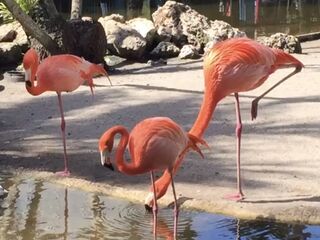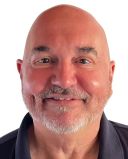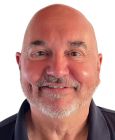Aging
Standing Out and Standing Strong
Personal Perspective: Only you decide what your life's challenges mean.
Posted February 5, 2022 Reviewed by Tyler Woods
Key points
- We do not have to internalize the shame and stigma others choose to attach to our age or medical conditions.
- Having a disability is not the same as defining ourselves as "disabled."
- Aging is a fact of life, but being "old" is a choice.
Have you ever seen a flamingo stand on one leg? They apparently like to fold one leg up under their pink-feathered body and balance themselves on the other leg. But how about a flamingo with only one leg?
I stood in awe as I watched a one-legged flamingo standing among a small flamboyance (the collective noun for a group of flamingos)—perfectly balanced, beautiful, and oblivious to being “different” from the others.
The site of that bird impressed me long after I visited Flamingo Gardens in Davie, Florida. For me, the flamingo was a brilliant example of what resilience looks like. You might even say it was a role model.

The bird had suffered the trauma of losing a leg. The injury must have been painful, and it certainly affected its standing ability. Yet there it was, standing tall and steady alongside the two-legged flamingos despite being “disabled.”
I saw myself in that flamingo.
On Having a Disability vs. Being “Disabled”
Living with HIV, I am considered disabled under the 1990 Americans with Disabilities Act. It is certainly reassuring to know I am legally protected against discriminatory practices in hiring and housing by those whose attitudes haven’t evolved in the four decades since the virus began to afflict and kill humans. But in no way do I consider myself "disabled."
I can't change others' attitudes; only they can do that. But I can make sure I don’t disable myself by internalizing the shame and stigma too many still believe I should feel for having the misfortune of contracting a socially disapproved virus. I can choose to reject, and I do, the idea that viruses have any meaning beyond what people choose to give them. Stigmatizing anyone with any illness says far more about the one holding such an attitude than it does about the individual with the illness.
Aging
While I was in Florida, I gave several talks connected to my book, Stonewall Strong, and my many years of reporting on HIV-AIDS as a journalist. One of those talks was at the monthly pot-luck luncheon gathering of older gay men called the Fort Lauderdale Prime Gentlemen.
Several of the 100-plus men in attendance told me afterward they were “surprised and impressed” by how openly I spoke about HIV and my personal experience of living with it. These men who survived the darkest years of the HIV-AIDS pandemic, who lost friends and partners and volunteered in extraordinary numbers to provide care and support and raise money, still apparently lived with the shame and stigma too many attach to this particular virus.
My talk wasn’t about HIV per se, but about defining for ourselves what our experience of aging “means.” But the same principle applies because both HIV and aging carry a heavy stigma. In both cases, that stigma has a lot to do with the fear of death that pervades our culture.
In response to that stigma, I like to say that while aging is a fact of life, “old” is a choice. We choose whether our age, health conditions, or anyone else’s views of us will be what defines us.
Some will look at us and only see an “old” person, or a “person with” HIV or something else. They will reduce us to our accumulated years or our diagnosis. But we don't have to reduce ourselves. We can push back against their reduction and reject their stigma.
Defining Ourselves, for Ourselves
It was interesting to be reminded that many still consider it either foolish or brave to speak as openly about living with HIV as I do. But I am clear that HIV is something I have; it’s not who I am. It’s a medical condition, a wound I have sustained in the process of being human. I define what it means to live with it; others’ attitudes about it do not define me.
Choosing for yourself what it means to age or live with HIV or another serious health condition—or, really, any one of your characteristics that somehow makes you different from whoever is defining what they consider "normal"—can either disable you or it can empower you.
Living resiliently means owning your life story, all of its pain, and all of its glory. It means telling your life story as a heroic tale of your survival in the face of whatever obstacles, setbacks, and tragedies you’ve had to face. It means standing tall and Stonewall strong—even if you have to do it on only one leg, like that beautiful flamingo in Florida.


